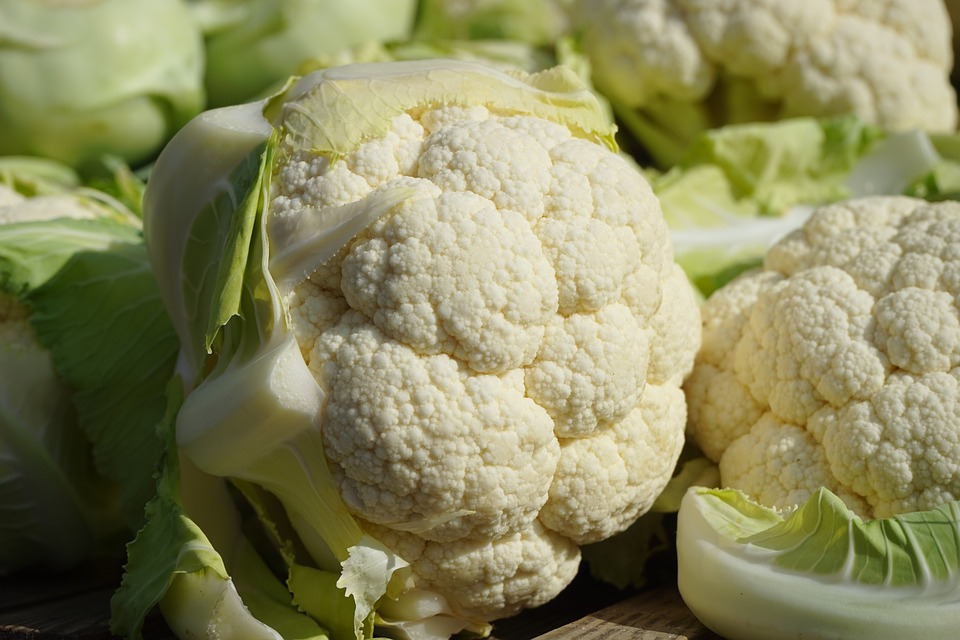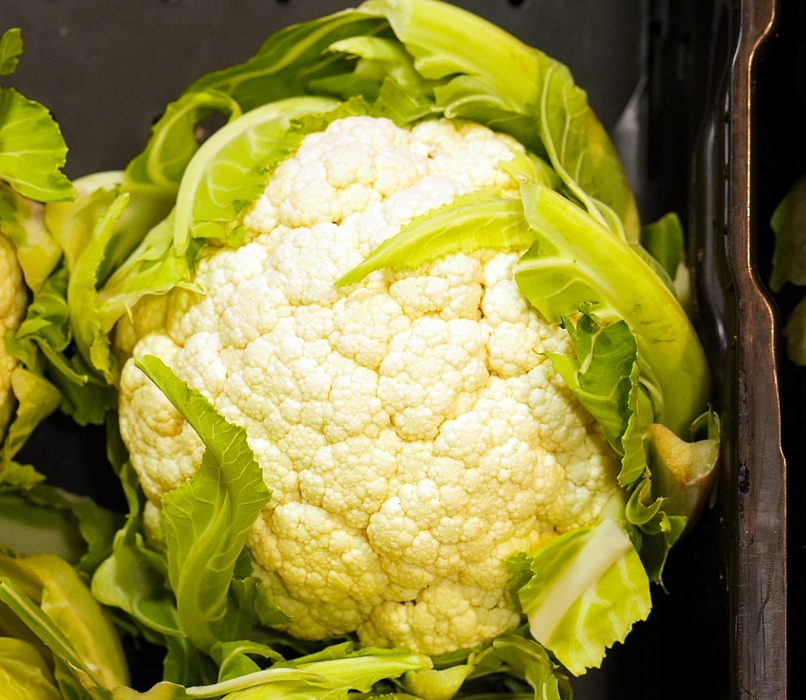Cauliflower, a popular vegetable in human kitchens, has become a subject of curiosity among rabbit owners. Can our furry companions enjoy this cruciferous delight? This comprehensive guide will navigate the world of rabbit nutrition and unveil whether cauliflower is a suitable treat for your beloved bunny. We will delve into its nutritional profile, potential benefits, and risks, empowering you to make informed decisions about your rabbit’s diet.
Part 1: A Nutritional Look at Cauliflower

Before we dive into the rabbit-specific aspects, let’s understand the nutritional makeup of cauliflower.
1.1. A Treasure Trove of Vitamins and Minerals
Cauliflower is a nutritional powerhouse, brimming with essential vitamins and minerals. These include:
- Vitamin C: A potent antioxidant that supports immune function and collagen production, crucial for healthy skin, bones, and blood vessels.
- Vitamin K: Vital for blood clotting and bone health, ensuring proper wound healing and strong bones.
- Vitamin B6: Involved in energy metabolism and neurotransmitter production, promoting brain function and energy levels.
- Folate: Essential for cell growth and division, particularly important during pregnancy for fetal development.
- Potassium: A vital electrolyte that helps regulate fluid balance and blood pressure, contributing to heart health.
- Fibre: Promotes digestive health and helps regulate blood sugar levels, crucial for a healthy gut and preventing spikes in blood sugar.
1.2. Low in Calories and Fat: A Diet-Friendly Option
Cauliflower is naturally low in calories and fat, making it a suitable option for weight management, particularly beneficial for overweight rabbits.
1.3. High in Water Content: A Hydrating Treat
The high water content in cauliflower contributes to its low calorie density and its ability to keep you feeling full. It also aids in hydration, important for maintaining overall health.
Part 2: Unveiling the Truth: Can Rabbits Eat Cauliflower?

Now, let's address the primary question: can rabbits safely enjoy cauliflower? The answer is more nuanced than a simple yes or no.
2.1. Caution is Key: A Balanced Approach
While cauliflower offers some nutritional benefits, rabbits have specific dietary needs that require careful consideration.
2.2. Potential Benefits: A Limited Nutritional Boost
In limited quantities, cauliflower can provide some benefits for rabbits:
- Fibre Source: Cauliflower provides a small amount of fibre, which can contribute to digestive health. However, it's crucial to remember that hay should be the primary source of fibre in a rabbit's diet. A lack of fibre in a rabbit’s diet can lead to digestive issues like stasis, which can be life-threatening.
- Vitamin Boost: The vitamins and minerals present in cauliflower can offer a small nutritional boost, but these should be obtained primarily through other sources. Hay and fresh vegetables are more effective sources of vitamins and minerals.
2.3. The Risks: Navigating Potential Health Challenges
There are a number of potential risks associated with feeding cauliflower to rabbits:
- Digestive Issues: Cauliflower contains complex carbohydrates that can be difficult for rabbits to digest, leading to bloating, gas, and diarrhoea. This can cause discomfort and even dehydration.
- Calcium Content: Cauliflower contains a moderate amount of calcium. While calcium is essential for rabbits, excessive intake can lead to urinary tract problems, especially in prone breeds like Dutch rabbits. This can cause pain and difficulty urinating, requiring veterinary intervention.
- Oxalates: Cauliflower contains oxalates, which can bind to calcium and hinder its absorption. This can further exacerbate calcium-related health issues. This can lead to urinary stones, a painful condition that may require surgery.
Part 3: Introducing Cauliflower with Caution: A Step-by-Step Guide
If you decide to offer cauliflower to your rabbit, do so with extreme caution and moderation.
3.1. Starting Small: A Gradual Introduction
Introduce cauliflower gradually, starting with a tiny piece. Observe your rabbit closely for any signs of digestive upset. A gradual introduction allows the rabbit's digestive system to adjust and minimises the risk of adverse reactions.
3.2. Choosing the Right Cauliflower: Freshness and Purity
Choose fresh, uncooked cauliflower florets. Avoid processed or cooked cauliflower, as these can contain added sugars, salt, and unhealthy fats, all of which are harmful to rabbits.
3.3. Proper Preparation: Ensuring Safety and Palatability
Wash the cauliflower florets thoroughly to remove any dirt or pesticides. Cut the florets into small, bite-sized pieces to make them easier for your rabbit to eat.
3.4. Supervision is Key: Monitoring Intake and Response
Always supervise your rabbit when offering cauliflower to ensure they don't eat too much. Observe their eating habits and any signs of digestive discomfort.
Part 4: Exploring Safer Alternatives: A Variety of Options
If you're looking for safe and healthy treat options for your rabbit, consider these alternatives:
- Hay: The foundation of a rabbit's diet should be unlimited hay, providing essential fibre for digestion, dental health, and overall wellbeing. Timothy hay is a popular choice due to its high fibre content and low calcium levels.
- Fresh Herbs: Many herbs are safe and beneficial for rabbits, such as parsley, cilantro, and basil. These provide a variety of vitamins and minerals and can add flavour to their diet.
- Leafy Greens: Dark, leafy greens like romaine lettuce, kale, and spinach are excellent sources of vitamins and minerals. They are also high in fibre and low in calories. However, spinach should be offered in moderation due to its higher oxalate content.
- Fresh Vegetables: Other safe vegetables for rabbits include bell peppers (especially red and green), carrots (in moderation), and cucumber. These offer a good balance of nutrients and are generally well-tolerated by rabbits.
Part 5: Recognising Signs of Digestive Upset: Watch for Clues
If your rabbit experiences digestive upset after eating cauliflower, watch for these signs:
- Diarrhoea: Loose or watery stools are a sign of digestive distress. This can be caused by changes in diet or the ingestion of foods that are difficult to digest.
- Bloating: A swollen abdomen can indicate gas buildup or intestinal blockage. This can be painful for the rabbit and require immediate veterinary attention.
- Gas: Frequent gas or belching can be a sign of digestive discomfort. This could indicate that the rabbit is having difficulty digesting the food.
- Loss of appetite: A decrease in appetite can be a sign of illness or discomfort. It's important to monitor your rabbit's food intake and consult a veterinarian if it changes significantly.
- Lethargy: A decrease in energy levels or lack of activity could indicate pain or illness. This could be related to digestive problems or other health issues.
5.1. Seeking Veterinary Attention: When to Call for Help
If you notice any of these signs, consult your veterinarian immediately. They can assess the situation and provide appropriate treatment, such as medication, fluids, or dietary changes. Prompt veterinary care can prevent complications and ensure your rabbit’s recovery.
Part 6: The Importance of a Balanced Diet: A Holistic Approach
A balanced diet is crucial for your rabbit's overall health and well-being.
6.1. Hay: The Cornerstone of a Healthy Diet
Hay should constitute the majority of your rabbit's diet, providing essential fibre for digestion, dental health, and overall wellbeing. Rabbits need to chew constantly to wear down their teeth, which grow continuously. Hay helps prevent dental problems and promotes healthy digestion.
6.2. Fresh Vegetables: A Nutritious Addition
Fresh vegetables should be offered daily in moderation, providing vitamins, minerals, and hydration. These should be varied to ensure a diverse intake of nutrients.
6.3. Pellets: A Supplemental Source of Nutrition
Pellets can be a valuable supplement, but they should be offered in limited quantities to avoid excessive calorie intake. They are a convenient source of essential nutrients, but should not replace hay or fresh vegetables.
6.4. Treats: Enjoy in Moderation
Treats should be given sparingly and only as a reward for good behaviour or to enhance bonding. Treats should not comprise more than 5% of a rabbit's total dietary intake.
Part 7: The Importance of Water: Hydration is Essential
Fresh, clean water should always be readily available to your rabbit. Rabbits should have access to unlimited fresh water at all times to prevent dehydration.
Part 8: FAQs: Addressing Common Concerns
8.1. Can rabbits eat raw cauliflower?
While raw cauliflower is technically edible for rabbits, it's best to avoid it. The raw form can be difficult for rabbits to digest and may lead to digestive issues. This is because raw vegetables contain complex carbohydrates that are difficult to break down.
8.2. Is cooked cauliflower safe for rabbits?
No, cooked cauliflower is not recommended for rabbits. Cooking can alter the nutritional profile of cauliflower and introduce harmful ingredients like salt, sugar, and unhealthy fats. These ingredients are harmful to rabbits and can cause health problems.
8.3. Can baby rabbits eat cauliflower?
Baby rabbits are particularly sensitive to digestive upset and require a very restricted diet. It's best to avoid offering cauliflower to baby rabbits until they are fully weaned and have developed a more mature digestive system. Baby rabbits have delicate digestive systems and are more susceptible to digestive issues.
8.4. How much cauliflower can a rabbit eat?
Cauliflower should be offered only in very small quantities, no more than a few small florets per week. Observe your rabbit's reaction and adjust accordingly. A gradual introduction and careful monitoring are crucial to avoid digestive problems.
8.5. What happens if a rabbit eats too much cauliflower?
Overconsumption of cauliflower can lead to digestive issues, including bloating, gas, diarrhoea, and loss of appetite. In severe cases, it can even lead to dehydration and health complications. These can lead to a decline in overall health and may require veterinary intervention.
8.6. What are the best vegetables to feed my rabbit?
The best vegetables for rabbits are those that are low in calcium, oxalates, and complex carbohydrates. Some excellent options include:
- Romaine lettuce: A good source of vitamins and minerals, with low calcium content.
- Kale: Rich in vitamins and antioxidants, but should be offered in moderation due to its higher calcium content.
- Spinach (in moderation): High in vitamins and minerals, but contains oxalates, which can bind to calcium and hinder its absorption.
- Bell peppers: Especially red and green peppers, which are low in calcium and high in vitamin C.
- Cucumber: A refreshing and hydrating vegetable, with low calorie and calcium content.
- Parsley: Rich in vitamin C and other nutrients, and can be a good source of fibre.
- Cilantro: Another good source of vitamins and minerals, but should be offered in moderation.
Conclusion: A Balanced Approach to Rabbit Nutrition
Cauliflower, while nutritious for humans, can pose a risk to rabbits due to its high calcium content, oxalates, and complex carbohydrates. While it can be offered in moderation and with extreme caution, it's best to avoid it altogether and opt for safer and more appropriate alternatives. By prioritising a balanced diet rich in hay, fresh vegetables, and fresh water, you can ensure your beloved bunny enjoys a long and healthy life. Always consult with your veterinarian for personalised advice regarding your rabbit's dietary needs. A veterinarian can provide tailored recommendations based on your rabbit’s breed, age, and health status, ensuring optimal nutrition and well-being.
Everyone is watching
-

Do Rabbits Lay Eggs? (The Surprising Truth)
OTHER TYPES OF PETSThis article will unravel the common misconception that rabbits lay eggs, exploring the fascinating world of r...
-

What's a Group of Rabbits Called? (A Comprehensive Guide)
OTHER TYPES OF PETSThis article delves into the fascinating world of rabbits, exploring the various terms used to describe a grou...
-

Can Rabbits Eat Grapes? A Guide to Safe Rabbit Treats
OTHER TYPES OF PETSThis comprehensive guide will explore the safety and suitability of grapes for rabbits, providing detailed inf...
-

Predators That Hunt Rabbits: A Guide to Natural Enemies
OTHER TYPES OF PETSI've always been fascinated by the circle of life, that delicate dance between predator and prey. Growing up ...
-

Are Rabbits Nocturnal Animals?
OTHER TYPES OF PETSThe question of whether rabbits are nocturnal animals is a fascinating one, with a surprisingly complex answer...
